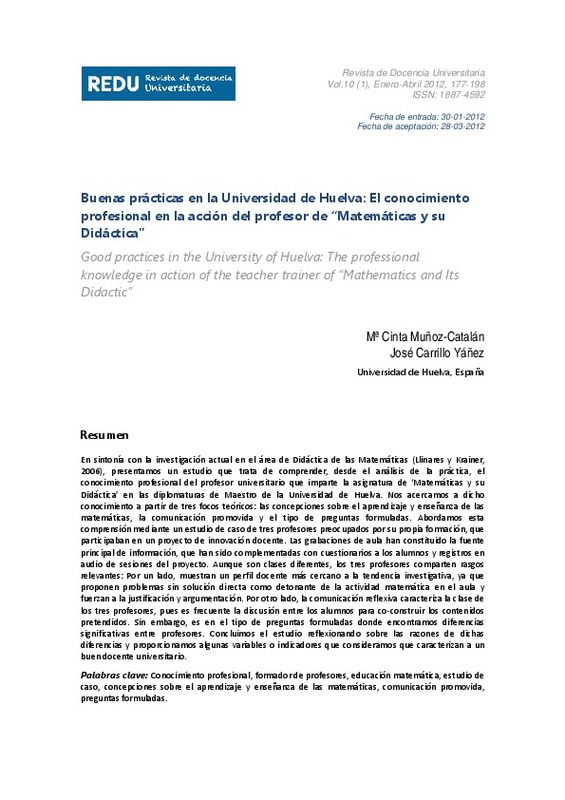Ainley, J. (1988). Perceptions of teachers' questioning styles. En A. Borbás (Ed.), Proceedings of the 12th Annual Meeting of the International group for the Psychology of Mathematics Education (pp. 92‐99). Veszprém, Hungría.
Abrantes, M. (2002). Recuerdos, expectativas y concepciones de los estudiantes para maestro sobre la geometría escolar y su enseñanza y aprendizaje. Badajoz: Tesis doctoral inédita.
Ball, D.L., Thames, M.H. y Phelps, G. (2008). Content knowledge for Teaching: What makes it Special? Journal of Teacher Education, 59, 389‐407.
[+]
Ainley, J. (1988). Perceptions of teachers' questioning styles. En A. Borbás (Ed.), Proceedings of the 12th Annual Meeting of the International group for the Psychology of Mathematics Education (pp. 92‐99). Veszprém, Hungría.
Abrantes, M. (2002). Recuerdos, expectativas y concepciones de los estudiantes para maestro sobre la geometría escolar y su enseñanza y aprendizaje. Badajoz: Tesis doctoral inédita.
Ball, D.L., Thames, M.H. y Phelps, G. (2008). Content knowledge for Teaching: What makes it Special? Journal of Teacher Education, 59, 389‐407.
Bassey, M. (1999). Case study research in educational settings. Buckingham: Open university press.
Bouhuijs, P.A.J. (2011). Implementing Problem Based Learning: Why is it so hard? Revista de Docencia Universitaria, Vol 9 (1), 17‐24.
Brendefur, J. y Frykholm, J. (2000). Promoting mathematical communication in the classroom: two preservice teachers' conceptions and practices. Journal of Mathematics Teacher Education, 3, 125‐153.
Carrillo, J. (1998). Modos de resolver problemas y concepciones sobre la matemática y su enseñanza. Huelva: Universidad de Huelva Publicaciones.
Carrillo, J. (1999). Conceptions and Problem Solving: A Starting Point and a Tool for Professional Development. En Ellerton, N.F. (Ed.) Mathematics Teacher Development: International Perspectives. West Perth, Australia: Meridian Press. Pp. 27‐46.
Carrillo, J. y Climent, N. (2011). The development of teachers' expertise through their analyses of good practice in the mathematics classroom. ZDM, 43(6‐7), 915‐926.
Carrillo, J., Climent, N., Gorgorió, N., Rojas, F. y Prat, M. (2008). Análisis de secuencias de aprendizaje matemático desde la perspectiva de la gestión de la participación. Enseñanza de las Ciencias, 26(1), 67‐76.
Carrillo, J. y Contreras, L.C. (1995). Un modelo de categorías e indicadores para el análisis de las concepciones del profesor sobre la matemática y su enseñanza. Educación Matemática, 7(3), 79‐92.
Carrillo, J. y Contreras, L.C. (eds.) (2000). Resolución de problemas en los albores del siglo XXI: una visión internacional desde múltiples perspectivas y niveles educativos. Huelva: Hergué.
Climent, N. (2005). El desarrollo profesional del maestro de Primaria respecto de la enseñanza de la matemática. Un estudio de caso, Doctoral dissertation. Michigan: Proquest Michigan University. www.proquest.co.uk.
Climent, N. y Carrillo, J. (2007). El uso del vídeo para el análisis de la práctica en entornos colaborativos. Investigación en la Escuela, 61, 23‐35.
Corbin, J. y Strauss, A.L. (2008). Basics of qualitative Research (3rd edition). Thousand Oaks: Sage Publications.
Denzin, N. K. y Lincoln, Y. S. (2000). The discipline and practice of qualitative research. In N. K. Denzin 6 y. S. Lincoln (Eds.) Handbook of Qualitative Research 2nd edition (1‐ 28). London: Sage Publications.
Estepa, J. (2000). El conocimiento profesional de los profesores de Ciencias Sociales. En Pagés, J.; Estepa, J. y Travé, G. (Eds.) Modelos, contenidos y experiencias en la formación profesional del profesorado de Ciencias Sociales. Huelva: Universidad de Huelva Publicaciones.
Ferreira, R.A.T. (2007). The teaching modes: a conceptual framework for teacher education. 5th Congress of the ERME (CERME 5). Larnaca, Chipre.
Fonseca, M.C. y Fernández, M.L. (Coord) (2010). Reflexionar sobre docencia universitaria. Sevilla: Fenix Editoria.
Guba, E. y Lincoln, Y. (1994). Competing paradigms in qualitative research. En N. Denzin y Y. Lincoln (eds.), Handbook of Qualitative Research (pp. 105‐117). London: Sage Publications.
Hativa, H. (2000). Teacher thinking, beliefs, and knowledge in higher education: An introduction. Instructional Science, 28, 331-334.
Lieberman, A. (1986). Collaborative research: working with, not working on…. Educational Leadership, 43, 28‐33.
Llinares, S. y Krainer, K. (2006). Mathematics (student) teachers and teacher educators as learners. A. Gutiérrez y P. Boero (Eds), Handbook of research on the Psychology of Mathematics Education: Past, Present and Future (429‐459). Netherlands: Sense Publishers.
Moreno, M. M. y Azcárate, C. (2003). Concepciones y creencias de los profesores universitarios de matemáticas acerca de la enseñanza de las ecuaciones diferenciales. Enseñanza de las Ciencias, 21(2), 265‐280.
Planas, N. y Alsina, À. (2009). Educación matemática y buenas prácticas. Barcelona: Editorial Graó.
Polya, G. (1957). How to Solve It, 2nd ed. Princeton: Princeton University Press.
Rué, J., Font, A. y Cebrián, G. (2011). El ABP, un enfoque estratégico para la formación en Educación Superior. Aportaciones de un análisis de la formación en Derecho. Revista de Docencia Universitaria, 9 (1), 25‐44.
Schoenfeld, A. (2000). Models of the Teaching Process. Journal of Mathematical Behavior, 18 (3), 243‐261.
Shulman, L.S. (1986). Those who understand: Knowledge growth in Teaching. American Educational Research Association, 15 (2), 4‐14.
Shulman, L.S. (1987). Knowledge and Teaching: Foundations of the new reform. Harvard Educational review, 57(1), 1‐22.
Stake, R.E. (2000). Case Studies. En Denzin, N.K. y Lincoln, Y. (Eds.), Handbook of qualitative research (435‐454). Thousand Oaks: Sage Publications.
Strauss, A. y Corbin, J. (1994). Grounded Theory Methodology: An overview. En N.K. Denzin, y Y. Lincoln, (Eds) Handbook of qualitative research (pp. 273‐285). Thousand Oaks, C.A.: Sage.
[-]








